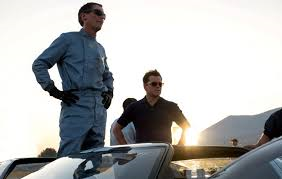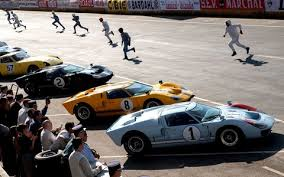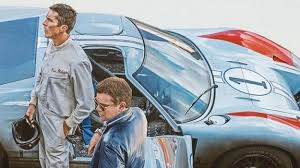Movie Review: Le Mans ’66

James Mangold’s Le Mans ’66 (titled Ford v Ferrari in America) is a sports drama of the very best quality which we rarely see in world cinema nowadays. Effectively balancing story-lines both on and off the track, it presents the efforts of a team of men seeking to break the dominance of a rival company in the famed Le Mans 24-hour race. There are a glut of familiar faces here, but Mangold’s casting of Matt Damon and Christian Bale in the principal parts is one of the foremost reasons why the film works so well as both a personal drama and a robust slice of entertainment. It’s the mid-1960s and a perennially po-faced Henry Ford II (Tracy Letts) is frustrated at the lack of visionary ideas in the iconic car company which his father raised from the ground. An audacious attempt to purchase the cash-strapped Ferrari company (in an effort to sex-up Ford’s image) badly backfires and Ford is insulted by the subsequent jibes directed at him by Enzo Ferrari. Determining to exact revenge in the best possible way, Ford orders that a racing car which he hopes will defeat Ferrari at Le Mans be constructed. An automobile executive by the name of Lee Iacocca (Jon Bernthal) is duly dispatched to put a team together for the upcoming race. Iacocca’s first port of call is to visit a former winner of the Le Mans race – one Carroll Shelby (Damon).

One of the most pleasing aspects of the story generally is the manner in which it portrays professionals in the field who have more than a passing interest in their work. Speaking at an early point to a captive audience, Shelby explains how his own father advised him to do something in life which he loved, so that work would be more akin to a vocation and not a labour. That’s what the racing men in this film do – they pursue their passion for the sport even at the risk of their own lives. Such an ethos – as held by Shelby – is equally true of a British driver called Ken Miles (Bale). A veteran of World War II, Miles is somewhat hot-headed and unpredictable, but he’s a genius when it comes to automobiles – a fact which Shelby (who can no longer race due to dangerous hypertension) has long since recognised. The powers-that-be at the Ford company (Josh Lucas’s Leo Beebe in the main) are not so convinced by Miles and therein lies one of the film’s recurring themes – that of the soulless corporate entity and its vested interests facing down the personal and impassioned endeavour.

Non-petrolheads (myself included) may not appreciate the multitude of references to engine oil and wheel nuts, but Le Mans ’66 has more than enough humour and human drama to make up for our auto shortcomings in this regard. There are some terrific sidebar stories, including the relationship of Miles and his wife Mollie (Caitriona Balfe) and that with his young son Peter (A Quiet Place’s Noah Jupe). The pivotal friendship between Shelby and Miles is at the very core of the screenplay (by Jez Butterworth, John-Henry Butterworth and Jason Keller) and Damon and Bale are excellent in their respective roles. A fine supporting cast includes the aforementioned Balfe, Bernthal, Letts, Lucas and Jupe.

In a refreshing sense, Le Mans ’66 does not seek to engage with the context of its historical setting, nor does it have much in the way of cultural or social allusion. The central premise here is the story of men (primarily) who are seeking to eke out for themselves a place in sporting history whilst accommodating their personal and sometimes professional differences. The major impediment in the way of all this is the very corporation which is funding them and more than a few audience hisses will be directed Lucas’s way during the course of the narrative. In one very funny scene, a fiercely determined Shelby takes Henry Ford II for a quick spin in the ever-evolving GT40 Mk II. Close to soiling himself at the end of the bullet-like excursion around the track, the weeping magnate reflects on how his own father would be proud of the car and the team’s efforts to win the famous race. In spite of his steely veneer, the captain-of-industry is keenly aware of the risks the drivers take when they get behind the wheel. This message is brought home even more so when Miles himself survives a near-fatal crash whilst testing the same car. The director of some fine films over the past few years (including 2005’s Walk the Line and 2017’s Logan), Mangold has a keen eye for detail and the retro feel which pervades Le Mans ’66 is one of the many joys of this excellent sports drama, The performance of the film is Christian Bale’s, but Matt Damon runs him a very close second in the acting stakes. And sometimes coming second will more than do as Miles reflects at the end of the grueling race. This one will certainly more than do as a rousing entertainment and an all-round superb sports story.
Rating: A
Good call! Certainly one of the top films of the year. Beautiful piece of work.